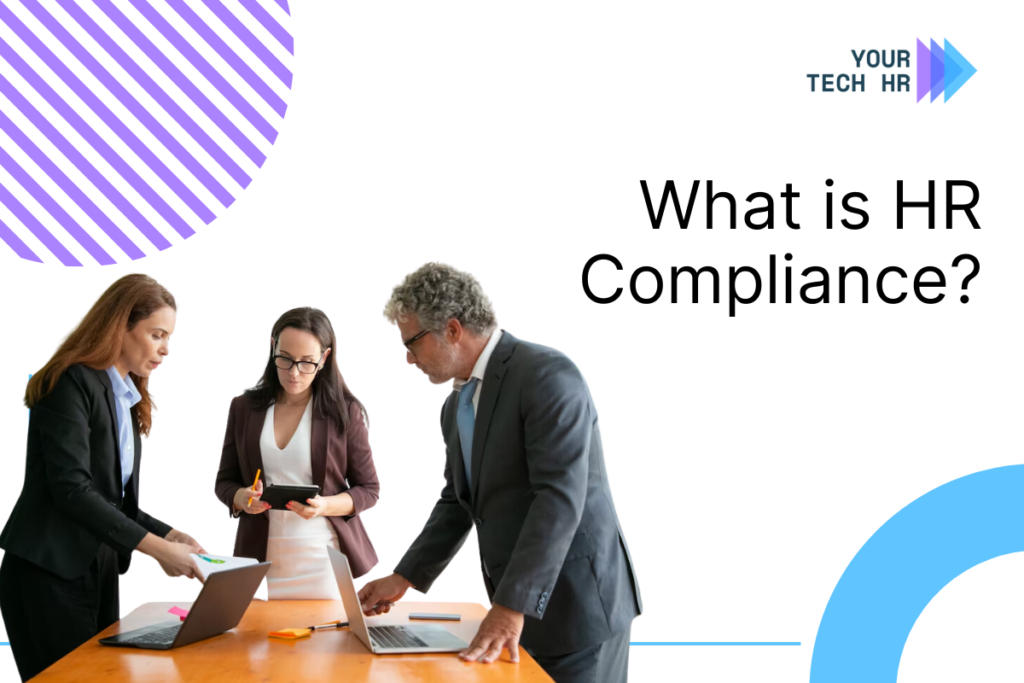What is HR Compliance?
In today’s complex business landscape, HR compliance has become a critical aspect of organizational success. But what exactly is HR compliance, and why is it so important? This comprehensive guide will explore the ins and outs of HR compliance, its significance in modern businesses, and provide practical strategies to ensure your company stays on the right side of the law.
HR Compliance
HR compliance refers to an organization’s adherence to all laws, regulations, and internal policies that govern human resources practices. It encompasses a wide range of areas, including hiring, compensation, workplace safety, employee rights, and more. Essentially, HR compliance ensures that a company’s practices align with legal requirements and industry standards.
The Scope of HR Compliance
HR compliance covers various aspects of the employee lifecycle, including:
- Recruitment and hiring
- Compensation and benefits
- Working hours and overtime
- Employee classification
- Workplace safety and health
- Anti-discrimination and equal opportunity
- Employee privacy
- Leave policies
- Termination procedures
The Importance of HR Compliance in Businesses
Maintaining HR compliance is crucial for several reasons:
- Legal Protection: Compliance helps protect your organization from costly lawsuits and legal penalties.
- Reputation Management: A company known for fair and lawful practices attracts better talent and maintains positive public perception.
- Employee Satisfaction: Compliant practices lead to better working conditions and higher employee morale.
- Operational Efficiency: Well-defined compliance procedures streamline HR processes and reduce risks.
- Competitive Advantage: Companies with strong compliance records often have an edge in contract bids and partnerships.
HR Compliance Best Practices
To ensure your organization stays compliant, consider implementing these best practices:
1. Stay Informed About Legal Requirements
HR laws and regulations are constantly evolving. Make it a priority to stay updated on changes at the federal, state, and local levels. Subscribe to relevant newsletters, attend seminars, and consider joining professional HR organizations.
2. Develop and Maintain Comprehensive HR Policies
Create clear, written policies that address all aspects of HR compliance. These should include:
- Employee handbook
- Anti-discrimination and harassment policies
- Leave policies (including FMLA)
- Compensation and benefits guidelines
- Workplace safety procedures
Regularly review and update these policies to ensure they remain current with changing laws and company practices.
3. Provide Regular Training
Conduct regular training sessions for both employees and managers on compliance issues. Topics should include:
- Sexual harassment prevention
- Workplace safety
- Anti-discrimination practices
- Proper handling of sensitive information
4. Implement Strong Record-Keeping Practices
Maintain accurate and up-to-date records of all HR-related activities, including:
- Employee files
- Payroll records
- I-9 forms
- Performance evaluations
- Training attendance logs
Ensure these records are stored securely and in compliance with data protection regulations.
5. Conduct Regular Audits
Perform periodic internal audits of your HR practices to identify and address any compliance gaps. Consider bringing in external experts for an unbiased assessment.
6. Foster a Culture of Compliance
Encourage a company culture where compliance is seen as everyone’s responsibility. Lead by example and ensure that management at all levels prioritizes ethical and compliant practices.
How to Ensure HR Compliance
Ensuring HR compliance requires a proactive approach. Here are some strategies to help your company stay compliant:
1. Create a Compliance Team
Designate a team responsible for overseeing compliance efforts. This team should include representatives from HR, legal, and management.
2. Develop a Compliance Calendar
Create a calendar that outlines important compliance deadlines, such as report filings, policy reviews, and required training sessions.
3. Utilize Technology
Invest in HR software that can help automate compliance-related tasks, such as tracking employee hours, managing leave requests, and generating required reports.
4. Establish Clear Communication Channels
Create open lines of communication for employees to report compliance concerns without fear of retaliation. Consider implementing an anonymous reporting system.
5. Partner with Experts
Consider working with employment law attorneys or HR consultants to ensure your practices align with current legal requirements.
HR Compliance Strategies for Companies
To develop a robust HR compliance strategy, consider the following steps:
- Risk Assessment: Identify areas of potential non-compliance within your organization.
- Policy Development: Create or update policies to address identified risks.
- Training and Education: Implement a comprehensive training program for all employees.
- Monitoring and Reporting: Establish systems to monitor compliance and report on key metrics.
- Continuous Improvement: Regularly review and refine your compliance strategies based on changing laws and organizational needs.
HR Compliance and Legal Requirements
HR compliance is closely tied to various legal requirements. Some key laws that impact HR practices include:
- Title VII of the Civil Rights Act
- The Fair Labor Standards Act (FLSA)
- The Americans with Disabilities Act (ADA)
- The Age Discrimination in Employment Act (ADEA)
- The Family and Medical Leave Act (FMLA)
- The Occupational Safety and Health Act (OSHA)
It’s crucial to understand how these laws apply to your organization and ensure your practices align with their requirements.
The Future of HR Compliance
As the workplace continues to evolve, HR compliance will face new challenges and opportunities. Some emerging trends include:
- Remote Work Compliance: With the rise of remote and hybrid work models, companies must navigate new compliance challenges related to work-from-home policies, cross-state employment, and virtual workplace conduct.
- Data Privacy Regulations: As data protection laws become more stringent, HR departments must ensure they’re handling employee information in compliance with regulations like GDPR and CCPA.
- AI and Automation in HR: As companies increasingly use AI in HR processes, ensuring these technologies comply with anti-discrimination laws will be crucial.
- Gig Economy Regulations: With the growth of the gig economy, new regulations around worker classification and benefits for independent contractors are likely to emerge.
Conclusion
HR compliance is a complex but essential aspect of running a successful and ethical business. By understanding what HR compliance entails, implementing best practices, and staying informed about legal requirements, companies can create a work environment that is not only compliant but also fosters employee satisfaction and organizational success.
Remember, HR compliance is not a one-time task but an ongoing process. By making compliance a priority and integrating it into your company culture, you can navigate the complex waters of HR regulations with confidence and integrity.


